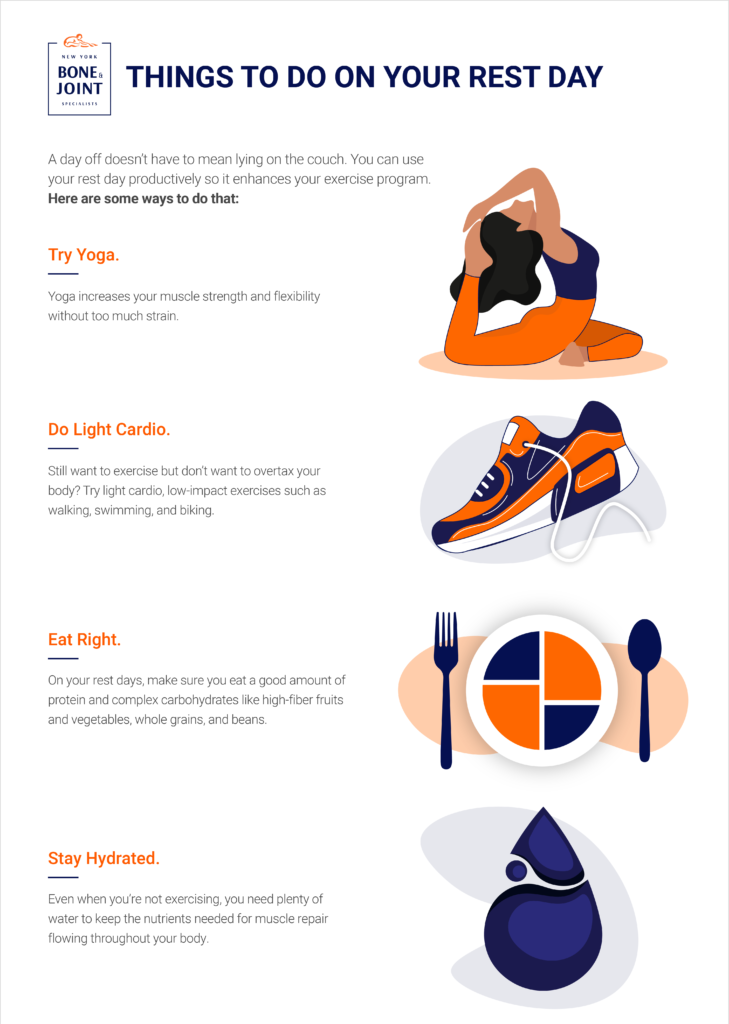It’s important to incorporate rest days into your workout program. Here’s why.
Whether you’re training for a marathon, building muscle, or trying to lose weight, it’s essential to schedule days off from your exercise routine. For workout enthusiasts, learning to rest may not be easy; in fact, they may discount this recommendation and keep working out every day. But that could be doing you more harm than good because rest is essential if you want the full benefits of your exercise program.
How often you need to rest depends on the intensity of your workouts and how long you’ve been training. Beginners should schedule more rest days as they build up stamina. Your individual exercise program also dictates your off days. For example, weightlifters typically work different muscle groups each day. If they work leg muscles one day, they can switch to arm muscles the next day so they’re not working the same muscle groups consecutively.
Generally speaking, at least one day of rest per week is recommended for best results. Here’s why recuperation is just as important as exercising.
3 Reasons You Need to Rest
Vigorous exercise means pushing yourself to your limits to achieve optimal results. Yet pushing yourself too hard can be harmful, as well. For these important reasons, you need to make rest a regular part of your exercise regimen:
- It Builds Muscle. Tiny muscle tears naturally occur when you exercise. When you rest, those tears repair and make the muscle stronger. If you exercise every day, you’re not giving your muscles time to recover. In addition, exercising may deplete your store of glycogen, a carbohydrate your body uses to fuel your workout. Rest days allow your body to stock up on those carbohydrates.
- Rest Prevents Injury. If you become overly fatigued from exercising without a break, your body will suffer. You may unknowingly practice poor form that could lead to a traumatic injury. And there’s a reason why overuse injuries are called just that: excessive exercise stresses your muscles and tissues to the point where they may break down and tear. Regular rest, on the other hand, improves your performance.
- It Can Improve Sleep. Although it may seem counterintuitive, too much physical activity can actually interrupt your sleep. Working out produces cortisol and adrenaline, two hormones that boost your energy. When you have an excess of those hormones in your body, you may find it harder to enjoy a good night’s sleep. By resting, you give your body an opportunity to let those hormones return to a normal level, thereby allowing you to sleep better.
What to Do on Your Rest Day
A day off doesn’t have to mean lying on the couch. You can use your rest day productively so it enhances your exercise program. Here are some ways to do that:

- Try Yoga. Yoga increases your muscle strength and flexibility. It also relaxes you and teaches you mindfulness so you’re rested and ready for the next day’s workout.
- Do Light Cardio. Still want to exercise but don’t want to overtax your body? Light cardio, low-impact exercises such as walking, swimming, and biking support heart health and lightly engage muscles while not straining those same muscles you need for more vigorous workouts.
- Eat Right. On your rest days, try storing up on muscle-repairing protein. Aim for 1.2 to 2.0 grams of protein per kilogram of body weight each day if you exercise regularly. To replenish your glycogen reserves, eat between 3 to 10 grams of complex carbohydrates per kilogram of body weight daily. Complex carbohydrates include high-fiber fruits and vegetables, whole grains, and beans.
- Stay Hydrated. Even when you’re not exercising, you need plenty of water to keep the nutrients needed for muscle repair flowing throughout your body. Water also prevents muscle cramps.
A fitness trainer can help you decide when to take a break. But you should also listen to your body. If you feel overly fatigued or muscle aches linger long after your workout, it’s probably time to rest.
The Fitness Specialists
New York Bone & Joint Specialists don’t only help patients overcome orthopedic conditions and injuries, our physicians and physical therapists are also here to ensure you get the most out of your fitness routine. We’ll discuss what works best for you and how to exercise safely for the best results. Contact us today for a consultation.



